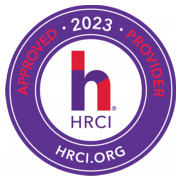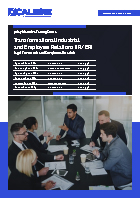| Date | Venue | Fee | |
|---|---|---|---|
| 30 Mar - 03 Apr 2026 | Istanbul - Turkey | $ 5,950 | Register Now |
| 27 Jul - 31 Jul 2026 | Dubai – UAE | $ 5,950 | Register Now |
| 31 Aug - 04 Sep 2026 | London - UK | $ 5,950 | Register Now |
| 23 Nov - 27 Nov 2026 | Dubai – UAE | $ 5,950 | Register Now |
| 04 Jan - 08 Jan 2027 | London - UK | $ 6,950 | Register Now |
About the Course
This 5-day comprehensive Transformational Industrial and Employee Relations (IR/ER) training course is a pivotal opportunity for HR Professionals, Industrial Relations Specialists, and Employee Relations Practitioners to deepen their expertise and strategic insight in navigating today's dynamic workplace environment. It is designed to equip delegates with the skills, knowledge, and insights needed to manage and optimise IR/ER practices within their organisations. Delegates will explore the foundational principles and advanced strategies that underpin successful IR/ER management. From understanding the historical development and legal structures influencing employment relations to mastering skills in conflict resolution, investigative procedures, negotiation, and union administration, each module is designed to cultivate a comprehensive grasp and hands-on application of best practices in IR/ER.
This interactive training program ensures delegates grasp theoretical concepts and develop hands-on skills through practical exercises, case studies, and collaborative discussions. They will enhance their ability to confidently handle complex workplace disputes, refine their investigative skills to ensure fairness and compliance, or strengthen their negotiation prowess to achieve mutually beneficial outcomes. It provides a tailored learning experience that meets diverse professional goals.
Beyond skill acquisition, it provides a platform for networking and knowledge exchange among peers and industry experts. Delegates will gain invaluable insights into emerging trends, best practices, and innovative IR/ER management strategies, empowering them to drive positive organisational change and contribute strategically to their company's success.
Core Objectives
By the end of the training course, delegates will be able to:
- Define the key principles and concepts of Industrial and Employee Relations (IR/ER)
- Identify relevant employment legislation and its implications for IR/ER practices
- Explain the historical evolution and development of IR/ER
- Summarise the rights and responsibilities of employers and employees in IR/ER contexts
- Apply conflict resolution models and strategies to resolve workplace disputes effectively
- Utilise investigation techniques to conduct fair and thorough workplace investigations
- Analyse different negotiation styles and strategies in various IR/ER scenarios
- Evaluate the effectiveness of mediation vs arbitration in resolving workplace conflicts
- Develop a strategic IR/ER framework aligned with organisational goals and compliance requirements
- Formulate a comprehensive plan for managing union relations and collective bargaining processes
- Assess the ethical implications of IR/ER decisions and actions
- Evaluate the impact of technological advancements on IR/ER practices and organisational dynamics
- Implement best practices in conflict resolution to enhance workplace harmony and productivity
- Demonstrate proficiency in conducting fair and effective workplace investigations
Training Approach
This training course emphasizes a dynamic blend of interactive lectures, practical exercises, case studies, and collaborative discussions. Delegates will engage actively in simulated scenarios and real-world case studies to apply theoretical concepts directly to practical situations. This hands-on approach ensures that delegates understand IR/ER management principles and develop the skills and confidence to navigate complex workplace challenges effectively. Moreover, peer-to-peer learning and feedback sessions foster a supportive knowledge-sharing environment and professional growth.
The Attendees
This training course suits HR Professionals, Industrial Relations Specialists, and Employee Relations Practitioners seeking to deepen their expertise in managing workplace dynamics. It is ideal for individuals responsible for conflict resolution, negotiation, and compliance within organisations across various industries.
Likewise, it will be valuable to the professionals but not limited to the following:
- Human Resources Managers
- Employee Relations Specialists
- Industrial Relations Officers
- Union Delegates and Officials
- Union Representatives
- Labor Relations Managers
- HR Business Partners
- Workplace Mediators
- Compliance Officers
- Employment Law Attorneys
- Organisational Development Consultants
Daily Discussion
DAY ONE: INTRODUCTION TO INDUSTRIAL AND EMPLOYEE RELATIONS
- Overview
- Importance of Effective IR and ER Practices
- Historical Perspectives and Evolution of IR/ER
- Key Legislation Affecting IR/ER
- Understanding Employment Contracts and Agreements
- Rights and Responsibilities of Employers and Employees
- Role of HR in IR/ER
- Theoretical Frameworks in IR/ER
- Ethical Considerations in IR/ER
- Cultural Diversity and Inclusion in IR/ER
DAY TWO: MANAGING WORKPLACE RELATIONS
- Conflict Resolution Models and Strategies
- Effective Communication in Conflict Resolution
- Mediation vs Arbitration: Choosing the Right Approach
- Legal Considerations in Workplace Conflict Resolution
- Building Trust and Rapport in Conflict Resolution
- Handling Difficult Conversations
- Cross-cultural Conflict Resolution
- Conflict Resolution in Virtual Work Environments
- Peer Mediation Programs
- Conflict Resolution Metrics and Evaluation
DAY THREE: CONDUCTING EFFECTIVE WORKPLACE INVESTIGATIONS
- Importance and Purpose of Workplace Investigations
- Legal Requirements and Best Practices for Investigations
- Planning and Preparation for Investigations
- Interview Techniques and Evidence Collection
- Analysing Findings and Drawing Conclusions
- Writing Investigation Reports
- Handling Sensitive Information and Confidentiality
- Case Management in Investigations
- Role of HR and IR Professionals in Investigations
- Ensuring Fairness and Due Process in Investigations
DAY FOUR: NEGOTIATION AND MEDIATION SKILLS
- Understanding Principled Negotiation
- Preparation and Planning for Negotiation
- Negotiation Styles and Strategies
- Ethical Considerations in Negotiation
- Overcoming Common Negotiation Challenges
- Effective Use of Persuasion Tactics
- Negotiating Across Generations
- Handling Power Imbalances in Negotiation
- Negotiation Tactics in Crisis Situations
- Negotiation and Decision Making
DAY FIVE: LABOUR MANAGEMENT AND UNION RELATIONS
- Dynamics of Unionized Work Environments
- Collective Bargaining Process
- Strategies for Building Positive Union Relations
- Negotiating Union Contracts
- Grievance Handling Procedures
- Labor Union Leadership and Structure
- Union Avoidance Strategies
- Legal Framework for Union Relations
- Conflict Resolution Strategies in Unionized Settings
- Impact of Technological Change on Union-Management Relations
Certificate Awarded
Upon successful completion of this training course, participants will be awarded a Certificate of Completion from XCalibre Training Centre, acknowledging their accomplishment. This certificate serves as a testament to their dedication to developing their skills and advancing their expertise in their respective fields.

Course Enquiry

A Human Resource Certification Institute (HRCI)® Pre-approved Training Course


